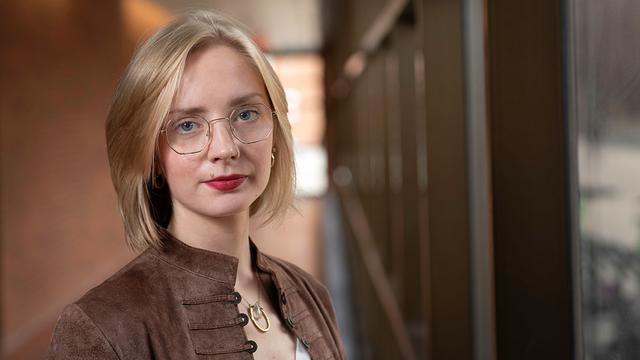By Ann Nordby
For Emma Pederson, it’s the ‘policy’ in the Humphrey School’s Master of Public Policy (MPP) program that inspires her.
Pederson, who is on track to complete her MPP degree this spring, began her graduate studies in social work, but then switched to the Humphrey School.
"The MPP has been invaluable in shaping what I saw my career as and where I wanted to go,” she said. “I really love the policy aspect, but I've also sunk my teeth into quantitative analysis skills. The econometrics and statistics really drew me to this program. They're really tangible skills."
Where Pederson ‘wants to go’ after she graduates is law school, to focus on police misconduct. She said her data analysis skills will help her to examine crime and policing data, to uncover patterns that may not be obvious.
‘Fell in love’ with statistics
Pederson has learned to design and perform quantitative research using statistical software programs such as STATA and R.
"Professor Gabe Chan made me fall in love with statistics," she said. "He did a really good job of teaching us these really concrete ideas and making them apply to policy analysis. It's very inspiring and motivating."
Another thing she appreciates is the IPUMS data center, which collects and distributes databases such as the American Community Survey and the US Census. This University asset makes it possible for scholars like her to examine public datasets using the methods they learn in class. "We're so lucky to have IPUMS here," she said.
Pederson has also learned how to present data in a compelling way. "Data visualization is such a small thing, but when you're working in public policy, it really matters how you communicate issues to a general audience,” she said. “Public policy research should be accessible to all people, because politics is for the betterment of everyone."
Pederson says one of the best things about the MPP program is that it is challenging and welcoming at the same time.
"It is competitive and rigorous, but the peer community has been extremely supportive and has really gotten me through. Having that cohort of people who've gone through it with me has surprised me, and has been one of the great parts of the whole program."
Commitment to a cause
Pederson is currently working for a Minneapolis nonprofit, Communities United Against Police Brutality; her godparents are also involved with the group. Her commitment stems from bad personal experiences with police as a teenager, and from working with many people who’ve had similar experiences.
Pederson has also been a teaching assistant at the Humphrey School, and interned as a sexual assault counselor at a crisis hotline. She has performed one-on-one counseling and cohosted a drop-in support group. She also helped create curriculum for the 40-hour sexual assault counselor training program.
Pederson has no illusions about her future plans. She knows she will have a career in which the challenges are big and the salaries relatively small. But she says the effort is worth it.
"For our disadvantaged sections of the population, people who are poor or marginalized, they have a very different experience of the police than other segments of society do."


